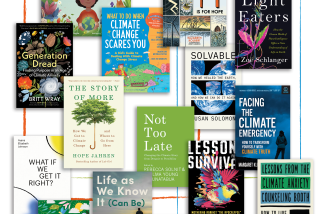Discoveries
- Share via
Conversations on the Edge of the Apocalypse: Contemplating the Future with Noam Chomsky, George Carlin, Deepak Chopra, Rupert Sheldrake, and Others; David Jay Brown; Palgrave/Macmillan: 268 pp., $26.95
PRESSURE to evolve has never been greater. In interviews with leading-edge thinkers in genetics, neurobiology, linguistics, media, psychiatry and parapsychology, David Jay Brown asks the Big Questions: Will we survive? What is the effect of technology on the biosphere? What happens to consciousness after death? What gives reason for hope?
“Ironically,” Brown writes in his introduction to “Conversations on the Edge of the Apocalypse,” the same technologies -- nanotechnology, artificial intelligence, advanced robotics, among others -- “that give us the power to reduce all organic life on the planet to a puddle of gray goo ... also hold the keys to a utopian world free of aging, disease, poverty and possibly even death.”
Despite their wildly varying concerns and views on specific questions, these thinkers show the power of intelligence and collective vision to change the present, reverse the past and influence the future.
Kary B. Mullis, winner of the 1993 Nobel Prize in chemistry for inventing polymerase chain reaction, or PCR, which makes it possible to separate and copy tiny DNA fragments, fears asteroids more than earthly causes of extinction.
Candace Pert, a neuroscientist working on a new AIDS drug, worries about the lowering of the IQ of average humans because of chemicals that are turning up in food today.
Biologist Rupert Sheldrake finds hope for the future in his research on telepathy in animals. Edgar D. Mitchell, the sixth astronaut to walk on the moon, describes his vision of the sun, moon, Earth, stars and planets on his return home.
These short interviews offer so much to ponder and follow up on, not least of which are a fantastic reading list, new thinkers to watch, websites to check and reasons to reach beyond the boundaries of ordinary dreams.
Most of all, this book offers positive visions of the future. “The fundamental attribute of human beings is that we seek to expand our horizons,” says inventor and computer scientist Ray Kurzweil, an expert in speech and pattern recognition who developed the first print-to-speech machine for the blind, the first text-to-speech synthesizer and the first synthesizer capable of recreating the sounds of a piano and other orchestral instruments.
“Biological evolution, which defines us as some specific niche, is not only limited, but is really missing the whole point of what human beings are,” he contends. “We’re not staying within the limitations of our biology, and we’ve already greatly extended the reach of our bodies and our minds through our technology.”
Raising Boys Without Men: How Maverick Moms Are Creating the Next Generation of Exceptional Men; Peggy F. Drexler, with Linden Gross; Rodale Books: 240 pp., $23.95
“ACROSS the country, a lightning bolt has split the trunk of the family tree, and it is growing in new and challenging directions,” Peggy F. Drexler writes in “Raising Boys Without Men.”
In 2000, 48% of all American households were presided over by unmarried people; 7.5 million households were run by single mothers. Yet Drexler found that there persists a prejudice against mothers, particularly those raising boys.
The research psychologist argues that her “maverick moms,” who are single by choice and lesbian, are raising sons who are not only masculine in the traditional sense but also have stronger communication skills and a deeper sense of justice and fairness, and are open to a wider range of possible careers, lifestyles and communities.
In “Raising Boys Without Men,” Drexler shifts the blame from mothers, who have been historically accused of making their sons homosexual, autistic and even schizophrenic, and onto the suffocating myth of the “normal family,” so pervasive in American culture.
Studies like hers, though not always the smoothest reading, help us frame questions and notice change.






